[Report] P4E Workshop: Philosophical Dialogue on the "Mother"
The workshop “Philosophical Dialogue on the Mother” was held on April 6th (Saturday). We had Ms. Eri Matsukawa of Café Philo (an organization in Osaka) as the facilitator of dialogue, and Professor Tetsuya Kono and Mr. Yohsuke Tsuchiya as guests.
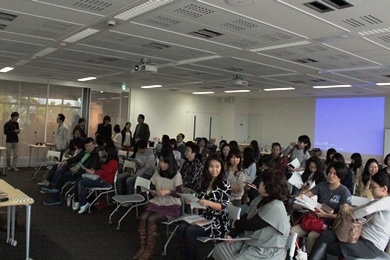
More than sixty people came to participate in the workshop. About a half them were mothers, some of whom came with their husband. The Studio Class Room, next to the workshop venue, turned into a colourful nursery, where children were playing during the workshop.
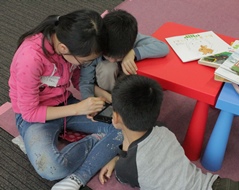
The workshop that hardly seemed to be a university event began with a speech by Associate Professor Shinji Kajitani. “Anyone can go out and come in anytime. If your child wants to be with the mother, you can take your child to this room. In that case, let’s have a dialogue with children crying.” Associate Professor Kajitani said from his own experience of talking with mothers that they see the society through their children, thinking in the scale of ten or twenty years. The mothers and other participants came to deepen such thoughts by themselves.
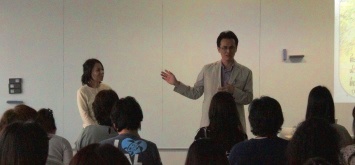
1st half: an introduction to café-philo by Ms. Matsukawa and a dialogue on “freedom” by groups of six people
Ms. Matsukawa launched the “Mothers’ Café Philo” for the members of a child rearing group, and facilitated dialogues for them for two years. She changed a group of sympathizing mothers into a group for having a dialogue by expressing ideas, and then into a group where any person could join. This story would surely be fascinating even to those who do not practice philosophy. The goal of café-philo, Ms. Matsukawa says, is “to think with others, to enjoy discussion itself, and to become able to enjoy discussion”.
Then it was finally time for philosophical dialogue. After an icebreaker instructed by Professor Kono, Ms. Matsukawa asked us to sit with six people in a circle. The question for the dialogue was “freedom”. Ms. Matsukawa showed us on a screen seven questions including “Can you do anything you want to?”, “Are you free when you are with others?” and “What is freedom useful for?” which were prepared beforehand. We chose one question by majority vote. The question chosen was “When do you feel you’re free?”
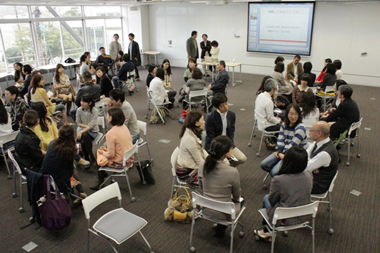
What we did using this question was the “questioning game”. In the “questioning game”, one person in a group answers questions. Five people freely ask questions to the answerer, beginning with the question we chose. Each member of the group becomes an answerer for five minutes.
The first thing I noticed in a circle was that this dialogue was simply extremely amusing. It was not only I but everyone else in the group who was really enjoying questioning and answering. This was an astonishing experience. I could hardly believe that I was in a group where people had just met each other, talking about personal things in an artificial situation. The members of the group sometimes had to pause and think. We were naturally led to reflect on ourselves. This dialogue was also playing the role of preparing the material for the next dialogue.
After the “questioning game”, Ms. Matsukawa projected the question “What is freedom?” on the screen to let us move to the next stage of the dialogue with the same group. Many questions came out of this stage in our group. They were questions such as “What is the difference between freedom and happiness?”, “Do we need restraints to feel freedom?” and “What is it to be unfree?” We also found the hypothesis that there were two kinds of freedom – the freedom of doing what we want and the freedom of being absorbed in what we like. The dialogue pushed our thought forward from the big abstract question “What is freedom?” This really happened even though there was no facilitator of the dialogue in the group.
2nd half: Philosophical Dialogue on the Mother
After a short break (during which my group continued the discussion very enthusiastically), all the participants were asked to stand in a circle to begin the second half with Mr. Tsuchiya’s icebreaker, which made us move and laugh. Then Ms. Matsukawa asked us to sit in a big circle, and said, “What would you like to think concerning the mother? What would you like to ask other participants to hear their thoughts?” There were nine questions proposed by the participants, which included “What is the role of the mother?” and “Do you see your mother as one human being?” Ms. Matsukawa eliminated the question “What was the curse left by your mother?” because she thought a dialogue on this question might hurt some participants. She also removed the question “Why did you decide to be a mother?” for the reason that it would be difficult to discuss it by all the participants. The question chosen by majority vote was “What qualifies someone to be a mother?” However, after Ms. Matsukawa asked us to close our eyes and asked if anyone thought this question would be too severe to discuss, she decided not to choose it. This clearly showed that depending on the topic of dialogue, some participants might have their personal problem, and thus the facilitator would have to be careful to secure the safety of all participants.
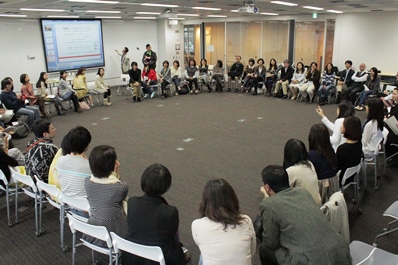
The question finally chosen was “How should we raise our child if we want the child to feel happy?” The dialogue began. One of the participants made an interesting point that a difficult situation was one in which the present happiness and the future happiness of the child contradict each other. As the dialogue slowly progressed, Ms. Matsukawa drew out three questions from our discussion and made them clear. Those questions were “How do you know your child is happy?”, “What is happiness in the first place?” and “What can the parents do for their child?” Then there was the thought “The child’s being happy is not enough because the parents need to heighten the child’s sense of happiness” and the thought “I want the child to feel happy in any situation”. There was also the new question “Does happiness last long?” Again our thoughts were pushed forward by a dialogue. But since we had less than an hour for this dialogue, there were more people who did not speak than there were those who did, and it seemed possible to continue the dialogue much longer. Ms. Matsukawa said that the feeling of wanting to think more, the questions that dwelled in the mind, and a viewpoint that seemed helpful were “gifts to bring home”.
A person who brought home such gifts will bring them to the next dialogue. The person will come to the next dialogue to “enjoy”. People come to enjoy thinking, and bring home some gifts that help them think more. If I say that a society where everyone can cultivate thoughts in that way is a good society, is there any objection? If there is, we can probably have a philosophical dialogue on it.
(Report: SHIMIZU Shogo)






